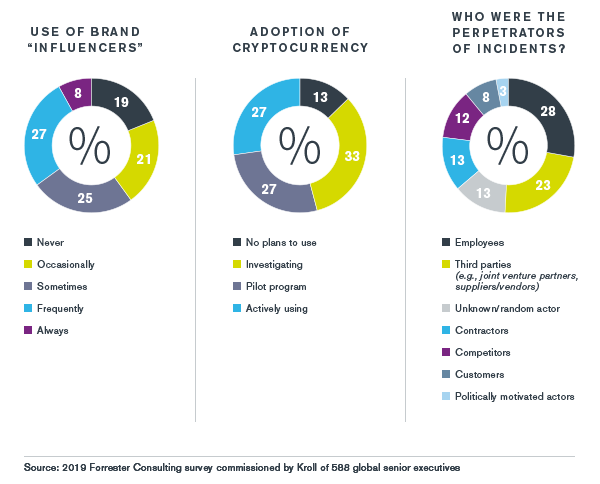Along with financial services, life sciences (encompassing healthcare, pharmaceuticals and biotechnology) is one of the most highly regulated of all industries, and its risk profile reflects that. In our survey, life sciences respondents reported the lowest rates of counterfeiting or gray market activity (8 percent vs. 17 percent for all industries) and fraud by external parties (10 percent vs. 28 percent for all industries) and, along with respondents in the financial services industry, the lowest level of significant leaks of internal information (33 percent vs. 39 percent for all industries).
The industry is helped in achieving these results by a strong risk management infrastructure. The internal audit function plays a greater role in detecting incidents in the life sciences industry than in any industry other than extractives (35 percent vs. 28 percent for all industries). The life sciences sector also has high confidence in its whistleblowing mechanisms (73 percent vs. 66 percent for all industries) and its respondents are more likely than those in any other industry to say their organizations respond to risk management incidents in consistent ways (85 percent vs. 75 percent for all industries).

The life sciences industry also places significant emphasis on reputational due diligence. It is more likely than any other industry in our survey to conduct such due diligence on suppliers (100 percent vs. 92 percent for all industries), business partners (100 percent vs. 92 percent overall), and, along with the professional services industry, potential M&A targets (94 percent vs. 89 percent overall). At the same time, respondents in this sector are the least likely to conduct reputational due diligence on investors (71 percent vs. 84 percent for all industries). This omission might be explained by a tendency for private investors in life sciences to be large, well-established players. Still, in line with these overall findings, the life sciences industry has more confidence in the effectiveness of its reputational due diligence than any other industry (85 percent vs. 73 percent for all industries).
While the life sciences industry experiences data theft at a rate slightly below the average (27 percent vs. 29 percent for all industries), it is more likely than any sector besides manufacturing to make combating data theft a priority (83 percent vs. 76 percent for all industries). This is no doubt influenced by regulatory requirements and the legal, financial and reputational consequences of a breach involving personal medical records and other life sciences data.
Respondents in the life sciences industry are also most likely to express confidence that their organizations’ monitoring of social media for adversarial activity is effective (87 percent vs. 71 percent for all industries). Effective social media monitoring is a natural consequence of the extensive regulation covering the marketing of medical products in many jurisdictions.
While life sciences respondents are less likely than those in any other industry to report experiencing disruption due to sanctions, tariffs and changes in trade agreements (15 percent vs. 27 percent for all industries), this does not mean the industry is immune to geopolitical concerns. Fifty-eight percent of life sciences respondents report having been affected by changes in economic treaties (vs. 51 percent for all industries); the same percentage has been affected by trade wars (vs. 54 percent overall). These figures may convey growing concern within the industry about the effects of continued geopolitical tensions on future availability of raw materials.

